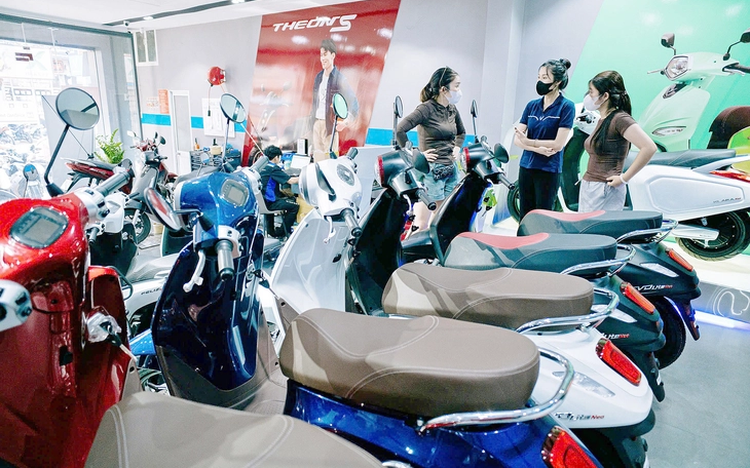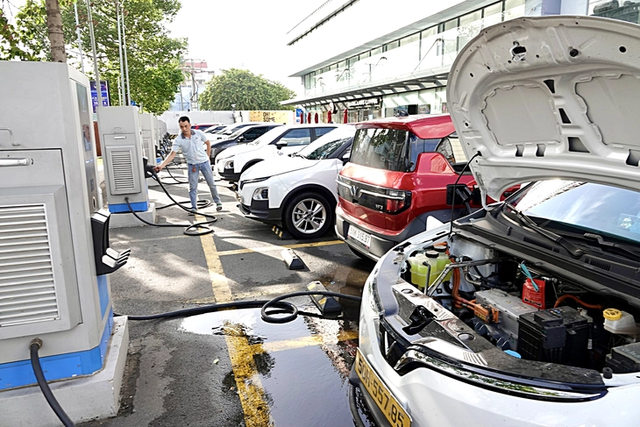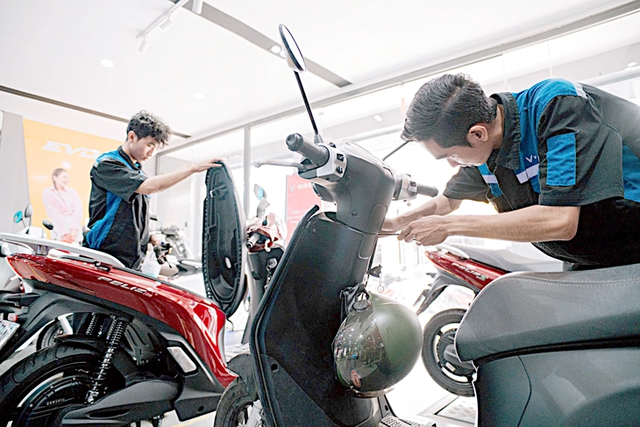
Customers receive electric vehicle consultations at a dealership on To Ngoc Van Street in Linh Xuan Ward, Ho Chi Minh City. Photo: Thanh Hiep / Tuoi Tre
Against the backdrop of policies gradually limiting gasoline vehicles in Hanoi and Ho Chi Minh City, the EV sector is expected to accelerate and become a mainstream choice for urban transport.
According to projections by RMIT University, Vietnam’s EV market could reach US$6.7 billion by 2030, growing at an average annual rate of 18 percent.
Experts advise activating three key factors: prioritizing infrastructure, coordinating supportive policies, and encouraging meaningful action from businesses to meet market needs.
A booming EV market
The Vietnamese market is seeing a surge in investment from both local and global players.
In Ho Chi Minh City, showrooms for electric cars and stores selling electric motorbikes have proliferated.
Prices are VND15–30 million ($573.3-1,145.7) for standard electric motorbikes and over VND1 billion ($38,190) for premium electric cars.
On social media, flashy ads promise 'five-minute battery swaps,' '3× the fuel savings,' and 'zero-percent installment plans,' fueling an energetic buzz in EV sales.
Shops line major streets and residential areas—Cach Mang Thang Tam, Phan Van Tri, and Truong Chinh—drawing constant crowds.
One store manager, Le Van Khoa, reported that “customers visit regularly; some who watched a live stream yesterday came today in person. Many ordered a month in advance. In June alone, our dealership sold over 30–40 units, double last year’s volume."
At malls like Vincom and Gigamall, brands regularly host EV showcases.
Consumer interest and willingness to purchase have surged, and the market is rapidly evolving.
Vietnamese carmaker VinFast no longer dominates as new names like BYD, Dongfeng, MG, Wuling, Aion, and Geely enter the race with competitive pricing and diverse models.
Brands accelerate
As demand for electric motorbikes rises sharply and Vietnam's EV market is no longer the exclusive 'playing field' of any single player, local manufacturers are ramping up production to capture market share.
VinFast aims to scale from 250,000–500,000 units per year to one million.

An electric vehicle charging station at a shopping mall in Ho Chi Minh City. Photo: T.T.D. / Tuoi Tre
Yadea Vietnam produces 500,000 annually; Selex Motors 200,000; Dat Bike 100,000; and Pega 50,000 units.
Japanese brands like Honda and Yamaha are also stepping into the electric motorbike market, likely prompting responses from Piaggio, Suzuki, and SYM.
Selex Motors is growing its fast-swapping battery network for logistics, while electric motorbike startup Dat Bike plans to triple its manufacturing capacity in Ho Chi Minh City and expand into the Mekong Delta.
Dat Bike founder Nguyen Ba Canh Son said that Vietnamese consumers prefer durable, cost-effective, easy-to-maintain bikes.
That is why the firm offers mobile service to customers instead of waiting for them to bring bikes to the company.
Selex Motors CEO Nguyen Huu Phuoc Nguyen warned that without swift action, Vietnamese businesses could lose ground to Chinese EV manufacturers which benefit from low-cost production and mature ecosystems.
According to Nguyen, although demand for EVs is expected to rise significantly in the coming years, challenges related to capital, technology, and infrastructure remain major barriers.
"Many domestic companies lack a complete ecosystem and face difficulties accessing funding to expand production, while Chinese electric vehicles are more affordable and come with well-established investment," Nguyen added.
Hoang Manh Tan, deputy general director of Son Ha Group, shared the view, saying that for EVs to become widespread, companies must not only offer quality products but also support consumers in purchasing the vehicles at reasonable prices, along with ensuring adequate charging infrastructure.
International players join the race
Global automakers are targeting Vietnam’s growing EV market.
BYD, one of the largest electric auto firms in the world, is reportedly considering a local factory, while South Korea’s Hyundai is pushing localization for a competitive advantage.
Premium brands, such as Mercedes-Benz, BMW, Audi, and Porsche, have started bringing in high-end EV models.
Distributors like Tasco plan to import Chinese EVs such as Geely and build charging stations.
The Zeekr brand of Chinese auto firm Geely is reportedly preparing a Vietnam launch by 2026 with fast-charging and competitive pricing.
Experts emphasized that success will not depend solely on the product but also on charging networks, after-sales support, and overall ecosystems.
According to tech specialist Nguyen Ngoc Dat, the EV market in Vietnam is "in a compelling stage with domestic and foreign players jointly performing."
VinFast currently leads with nationwide charging infrastructure, pushing competitors like BYD, Geely, and Wuling to invest or partner on charging stations.
Consumers demand ecosystems, not just products
Market analyst Tran Minh Khanh noted that users are no longer asking, “Are electric vehicles good?”, but now ask, "Where do I charge?”, “How much does a battery swap cost?”, and “Is there financing support?”
Consumer expectations now require full ecosystems, without which brands risk losing customers.
Rider Thanh Long, 35, stated that with Ho Chi Minh City mandating electric vehicles for ride-hailing next year, he is saving up for a motorbike.
"As long as it runs well, charges easily, and has good financing, I’m in," Long said.
Office worker Nguyen Thanh Binh said, "If charging networks were as common as gas stations, I’d switch immediately."

An electric motorbike repair station at a showroom in Linh Xuan Ward, Ho Chi Minh City. Photo: Thanh Hiep / Tuoi Tre
Many cafés and eateries now offer electric motorbike charging for VND10,000–20,000 ($0.4-0.8) per session or for free to attract EV-owning customers.
Meanwhile, the EV accessory market is growing with portable chargers, battery packs, and wall-mount chargers sold via automakers and e-commerce platforms.
Tech startups are introducing apps to locate nearby chargers, manage battery levels, and predict charging durations.
Policy, infrastructure must lead
Real-world trends show that the EV ecosystem race is intensifying, with VinFast dominating with hundreds of thousands of charging points.
Startups like EBOOST, DatCharge, Charge Plus, and EVG are scaling rapidly.
EVN, PVOIL, PV Power, and Petrolimex are experimenting with chargers at gas stations and residential areas.
Hanoi, Ho Chi Minh City, and Hue City now require at least two public charging points in every new urban area.
Experts stress that charging stations are the backbone of green transport. Without them, EV adoption is impossible.
Energy expert Ngo Tri Long suggested that EV charging should be part of the energy security strategy and supported by tax and land incentives, green loans, PPP investment, and direct subsidies for consumers.
Tran Anh Tung, a lecturer at the Ho Chi Minh City University of Economics and Finance, called for credit support, subsidies, or financial incentives to ease the burden on residents, especially in large cities where motorbikes remain dominant.
He also highlighted the need to improve battery technology to reduce charging time and minimize impact on drivers’ jobs.
Le Duy Thanh, CEO of a charging equipment firm, proposed the government establish a green tech startup fund, offering land-use incentives for firms to develop public charging stations.


Max: 1500 characters
There are no comments yet. Be the first to comment.